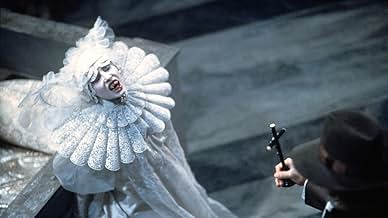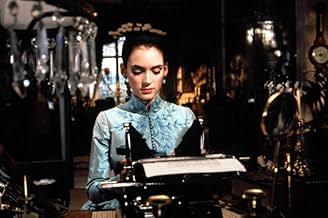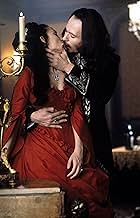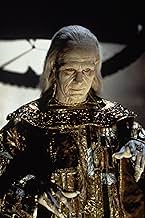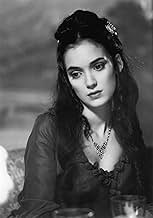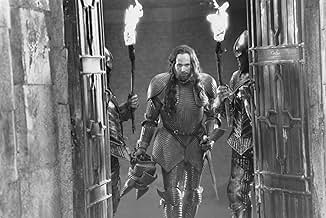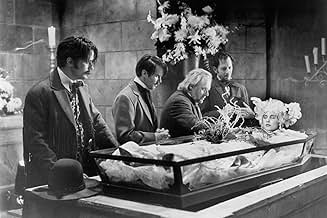Centuries-old vampire Count Dracula comes to England to seduce his barrister Jonathan Harker's fiancée Mina Murray and wreak havoc in the foreign land.Centuries-old vampire Count Dracula comes to England to seduce his barrister Jonathan Harker's fiancée Mina Murray and wreak havoc in the foreign land.Centuries-old vampire Count Dracula comes to England to seduce his barrister Jonathan Harker's fiancée Mina Murray and wreak havoc in the foreign land.
- Director
- Writers
- Stars
- Won 3 Oscars
- 25 wins & 25 nominations total
Billy Campbell
- Quincey P. Morris
- (as Bill Campbell)
- Director
- Writers
- All cast & crew
- Production, box office & more at IMDbPro
Featured reviews
I have seen multiple versions of Dracula, but none compare to 1992's version starring Gary Oldman, the definitive Count Dracula in my opinion. This film is lavish, decadent and wonderfully vivid. It captured the gothic spirit of the novel, it's deep, romantic, and mixed with tender and violent moments. The visuals to this day are exquisite, the costumes, sets and scenes of Victorian England are superb.
Oldman is incredible, but the supporting cast of Reeves, Hopkins and Ryder are terrific, Winona Ryder's delicate character is superb. The accompanying soundtrack was also fantastic, great songs from Annie Lennox.
A true classic. 9/10
Oldman is incredible, but the supporting cast of Reeves, Hopkins and Ryder are terrific, Winona Ryder's delicate character is superb. The accompanying soundtrack was also fantastic, great songs from Annie Lennox.
A true classic. 9/10
... although I keep remembering that this "modern" tale was filmed 31 years ago.
James V. Hart's script seemed heavily indebted to Fred Saberhagen's The Dracula Tape (1980), which was a re-telling of the events of Bram Stoker's novel from the POV of Dracula, whose POV was missing from the Stoker original. It was also much more favorable towards Dracula, and added a lot of the romantic elements.
One thing that it did get right was having all the actual characters from the original novel. Many of the adaptations removed one or more of the suitors, especially the American Quincy Morris, or age up Dr. Seward, or make him the father of Mina or Lucy. This version did present them as they were in the novel.
Stylistically, it was unusual even for 1992, with Coppola said to be attempting some sort of visual homage to silent and classic film techniques, with some things looking deliberately artificial.
I recall at the time thinking Keanu Reeves was highly miscast, and his awkward performance nearly undid the whole film for me. Anthony Hopkins was coming off his Oscar win for The Silence of the Lambs, and he did seem to have his performance pitched to the rafters. His characterization seemed more in line with the Saberhagen book, where Van Helsing is depicted as more of a religious fanatic with a cruel streak.
The whole enterprise was a cash grab for Coppola who was coming off the relative disappointment of The Godfather Part III. It was a success, and kickstarted a "prestige horror" trend over the next several years, with Mary Shelley's Frankenstein, Wolf, and Interview with the Vampire.
James V. Hart's script seemed heavily indebted to Fred Saberhagen's The Dracula Tape (1980), which was a re-telling of the events of Bram Stoker's novel from the POV of Dracula, whose POV was missing from the Stoker original. It was also much more favorable towards Dracula, and added a lot of the romantic elements.
One thing that it did get right was having all the actual characters from the original novel. Many of the adaptations removed one or more of the suitors, especially the American Quincy Morris, or age up Dr. Seward, or make him the father of Mina or Lucy. This version did present them as they were in the novel.
Stylistically, it was unusual even for 1992, with Coppola said to be attempting some sort of visual homage to silent and classic film techniques, with some things looking deliberately artificial.
I recall at the time thinking Keanu Reeves was highly miscast, and his awkward performance nearly undid the whole film for me. Anthony Hopkins was coming off his Oscar win for The Silence of the Lambs, and he did seem to have his performance pitched to the rafters. His characterization seemed more in line with the Saberhagen book, where Van Helsing is depicted as more of a religious fanatic with a cruel streak.
The whole enterprise was a cash grab for Coppola who was coming off the relative disappointment of The Godfather Part III. It was a success, and kickstarted a "prestige horror" trend over the next several years, with Mary Shelley's Frankenstein, Wolf, and Interview with the Vampire.
Saw this movie in theatre in 1992 . Me and a friend smoked so weed before the movie which made the movie very scary to use and very enjoyable well made movie . All characters are played very well . The sets and customes make this movie so good and are able to watch many times over . I recommend this movie . 9/10.
Incessantly gothic & unabashedly erotic, Dracula brings Bram Stoker's literary classic to the film canvas in all its Victorian glory & required faithfulness and is a visual splendour overflowing with bold vision & audacious choices. But the technical mastery on display is also severely hampered by the film's inconsistent tone, overdone theatrics, casting choices & passionless performances.
Directed by Francis Ford Coppola (The Godfather & Apocalypse Now), the story unfolds like an eerie & sensual reverie and is substantially elevated by its operatic set pieces, lavish costumes, vivid photography, old-school effects & uncanny score. The film gets the atmosphere right with its inspired use of colours, shadows, lighting & subliminal imagery that works in tandem with its sexually charged narrative.
However, the impressionistic touches, cinematic flourishes & technical ingenuity still don't prove to be enough to mask its shortcomings, for its bloated length & over-the-top drama are further exacerbated by the casting decisions that nearly destroys the whole picture. Neither Keanu Reeves nor Winona Ryder are right choices for their roles and as for the remaining cast, their inputs are serviceable at best & forgettable at worst.
Overall, Dracula is a visual feast that delivers on mood, setting & filmmaking creativity but the commitment evident in the technical aspects are sorely lacking in the acting department. And that in effect hurts its ability to fully immerse viewers into its dreamlike escapade. Its romantic gestures are sincere even if the tonal shifts are all over the place but for a premise that has so much promise, the film as a whole leaves much to be desired.
Directed by Francis Ford Coppola (The Godfather & Apocalypse Now), the story unfolds like an eerie & sensual reverie and is substantially elevated by its operatic set pieces, lavish costumes, vivid photography, old-school effects & uncanny score. The film gets the atmosphere right with its inspired use of colours, shadows, lighting & subliminal imagery that works in tandem with its sexually charged narrative.
However, the impressionistic touches, cinematic flourishes & technical ingenuity still don't prove to be enough to mask its shortcomings, for its bloated length & over-the-top drama are further exacerbated by the casting decisions that nearly destroys the whole picture. Neither Keanu Reeves nor Winona Ryder are right choices for their roles and as for the remaining cast, their inputs are serviceable at best & forgettable at worst.
Overall, Dracula is a visual feast that delivers on mood, setting & filmmaking creativity but the commitment evident in the technical aspects are sorely lacking in the acting department. And that in effect hurts its ability to fully immerse viewers into its dreamlike escapade. Its romantic gestures are sincere even if the tonal shifts are all over the place but for a premise that has so much promise, the film as a whole leaves much to be desired.
"Apocalypse Now" worked due to its hazy, surreal vision of a hellish world. Coppola returned thirteen years later and created a similarly haunting and poetic so-called "masterpiece," a supposed truthful adaptation of Bram Stoker's Dracula tale - when, in fact, the truth is that this movie is no more faithful to Stoker than the (superior) Universal Pictures original.
The hazy film-making is visually satisfying, and some of the special effects are - simply put - amazing. Coppola's backlighting and use of shadows is creative and unique. But, unfortunately, after a while his emphasis on style over content begins to eat away at the film's other strengths - the relationship between the heroine (Winona Ryder) and Dracula (Gary Oldman) is weak. Many story links are completely nonsensical and people appear and disappear at whimsy. The heroine's fiancée (Keanu Reeves) writes to her from Transylvania, asking her to depart at once to marry him; in a matter of one or two scenes she has suddenly traveled a vast distance and is standing at the alter prepared to wed. It seems like Coppola loses a grip on his characters and plotting very early on.
Oldman gives a chilling performance but isn't given very much to do, because he's set aside and the special effects take over. The opening scenes of his battle and his motivation to become the King of the Undead is very enthralling - if Coppola had maintained this mixture of style and content the movie would have been far better.
The casting of the weak Keanu Reeves and Winona Ryder in leading roles harms the impact of the film as well. Reeves sounds like a Californian pothead imitating a Brit; Ryder treats the material as if it is a dramatic, over-the-top theatre rendition; every line she speaks is sickeningly cheesy.
Anthony Hopkins turns in a disappointing performance as the utterly forgettable Van Helsing, who is given very little to do in this particular film apart from show up when convenient and sprout fancy little one-liners, most of them dramatic closers to scenes (e.g. "We are dealing with a demon!", then a cut-away to another scene.) Overall, "Dracula" is a good film and is worth seeing for its visuals alone. It is not, however, the strongest adaptation of Bram Stoker's novel; given the hype surrounding its release in 1992, the completed effort is rather lackluster in the story department.
The hazy film-making is visually satisfying, and some of the special effects are - simply put - amazing. Coppola's backlighting and use of shadows is creative and unique. But, unfortunately, after a while his emphasis on style over content begins to eat away at the film's other strengths - the relationship between the heroine (Winona Ryder) and Dracula (Gary Oldman) is weak. Many story links are completely nonsensical and people appear and disappear at whimsy. The heroine's fiancée (Keanu Reeves) writes to her from Transylvania, asking her to depart at once to marry him; in a matter of one or two scenes she has suddenly traveled a vast distance and is standing at the alter prepared to wed. It seems like Coppola loses a grip on his characters and plotting very early on.
Oldman gives a chilling performance but isn't given very much to do, because he's set aside and the special effects take over. The opening scenes of his battle and his motivation to become the King of the Undead is very enthralling - if Coppola had maintained this mixture of style and content the movie would have been far better.
The casting of the weak Keanu Reeves and Winona Ryder in leading roles harms the impact of the film as well. Reeves sounds like a Californian pothead imitating a Brit; Ryder treats the material as if it is a dramatic, over-the-top theatre rendition; every line she speaks is sickeningly cheesy.
Anthony Hopkins turns in a disappointing performance as the utterly forgettable Van Helsing, who is given very little to do in this particular film apart from show up when convenient and sprout fancy little one-liners, most of them dramatic closers to scenes (e.g. "We are dealing with a demon!", then a cut-away to another scene.) Overall, "Dracula" is a good film and is worth seeing for its visuals alone. It is not, however, the strongest adaptation of Bram Stoker's novel; given the hype surrounding its release in 1992, the completed effort is rather lackluster in the story department.
10 Horror Recommendations on Netflix
10 Horror Recommendations on Netflix
After Weapons and Together made him crave more horrors, IMDb Editor Arno Kazarian waded through Netflix's carousels to offer up some recommendations for fans of all stripes.
Did you know
- TriviaPrince Vlad's scream after he drives his sword into the cross is not the voice of Gary Oldman. Lux Interior, lead singer of punk band The Cramps, recorded the scream, and it was dubbed in.
- GoofsElisabeta's eyebrows and eyelids twitch visibly when Prince Vlad stumbles down to view her dead body.
- Alternate versionsBritish video version contains a scene where Jonathan Harker's nipple is licked by one of the female vampires, who then bites it and causes it to bleed. When the film premiered in America this scene was not included.
- ConnectionsEdited into Bram Stoker's Dracula: Deleted and Extended Scenes (2007)
- SoundtracksLove Song for a Vampire
(from 'Bram Stoker's Dracula')
Produced by Stephen Lipson
Written and Performed by Annie Lennox
Courtesy of BMG Ariola Muenchen GmbH
Everything New on Netflix in September
Everything New on Netflix in September
"Wednesday" returns. So does "Alice in Borderland" (finally). Here's the lineup of new and returning movies and series streaming on Netflix this month, ranked by popularity for your hopeful convenience.
Details
- Release date
- Countries of origin
- Languages
- Also known as
- Drácula, de Bram Stoker
- Filming locations
- Production companies
- See more company credits at IMDbPro
Box office
- Budget
- $40,000,000 (estimated)
- Gross US & Canada
- $82,522,790
- Opening weekend US & Canada
- $30,521,679
- Nov 15, 1992
- Gross worldwide
- $215,862,692
- Runtime
- 2h 8m(128 min)
- Color
- Sound mix
- Aspect ratio
- 1.85 : 1
Contribute to this page
Suggest an edit or add missing content





